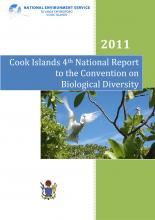2011 Cook Islands 4th National Report to the Convention on Biological Diversity
Kelvin Passefield
,
Teariki Rongo
2011
This report is presented in 4 chapters. Chapter 1 provides background on the process of developing the Cook Island National Biodiversity Strategy and Action Plan (NBSAP). The Cook Islands was one of the first countries to commit to the CBD by signing it at the Earth Summit in 1992, and the Cook Island National Biodiversity Strategy and Action Plan (NBSAP) was one of the first to be completed for the Pacific Region. This in itself was a positive step towards implementation of the CBD. The NBSAP was prepared based on feedback from stakeholder workshops. However, progress on implementation of the NBSAP has been limited, and significant progress has been made only in several areas in regard to meeting the targets of the CBD. Chapter 2 deals with progress on implementation of the NBSAP. The most significant achievement has been the improvement in the status of threatened species, and this target has been achieved through the upgrading of the Rarotongan Flycatcher (Pomarea dimidiata) from critically endangered to endangered on the IUCN red list of threatened species, in addition to this a number of other targets have been partially achieved. The Cook Islands Biodiversity database, listing the countrys biodiversity is a significant and on-going step towards achieving article 7 of the CBD. Chapter 3 relates to mainstreaming of biodiversity considerations throughout both Government and non-government institutions. This was attempted through the incorporation of the NBSAP into the National Environment Strategic Action Framework (NESAF) and the subsequent inclusion of the NESAF into the National Sustainable Development Plan (NSDP). Despite this, the policy framework did not translate to on the ground mainstreaming of biodiversity concerns. A table is presented showing the role of various institutions in biodiversity. Chapter 4 looks at the CBD targets, and shows the status of the Cook Islands in meeting these targets. Success has been achieved in relation to Goal 2, promoting the conservation of species diversity. Areas where achievements have not met the targets include percent coverage of protected areas, and effective mainstreaming of biodiversity. Another area where more effort is required is in the formulation and implementation of effective management plans for major alien species that threaten ecosystems, habitats or species. Though many targets have not been met, overall, the Cook Islands have made considerable progress towards meeting their obligations under the CBD. The main problem lies not with lack of progress, but in trying to find where this progress has been made. There is a need to improve the monitoring and evaluation system in order to identify progress. The preparation of a report such as this should be an ongoing activity, with progress against goals recorded as it is made. This will make the preparation of future reports much more straightforward, and easily completed using the capacity within the National Environment Service.
